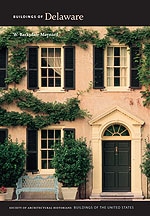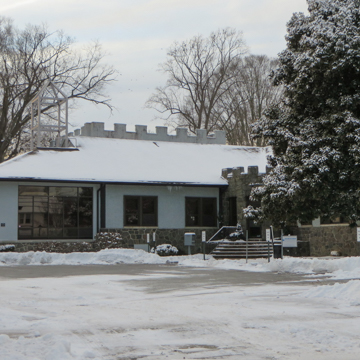You are here
318 South College (Press of Kells)
This much-altered building was the printing plant of Johnson, founder of the Newark Post in 1910 and famous as a civic-minded publisher and progressive Republican secretary of state in the reform era of Delaware politics. When his first plant on Main Street was acquired for demolition by the expanding university, Johnson moved here, a then-rural district well south of the town center, to avoid taxes. He had visited Elbert Hubbard's Roycroft community in upstate New York in July 1911 and was inspired to replicate its Arts and Crafts flavor, fashioning a cardboard model to guide the workmen. A square stone tower with crenellations, copying one at the Roycroft Inn, rose above the Tudor Revival wings with walls of pebbledash. Stone came from farmers' fields on Iron Hill and was laid by two Italian craftsmen who sang opera as they worked, to Johnson's delight. A linotype operator chose the name, based on the famous medieval manuscript, the Book of Kells (800 AD). This was fitting, as Johnson, in the tradition of John Ruskin, William Morris, and Hubbard, emphasized neo-medievalism, handicraft (“Head, Heart, and Hand” was his motto), use of local materials, and capacious hearths (such as one in “The Whim,” a lounge named after a line in Emerson's essay Self-Reliance). Just west is Johnson's irregular, self-designed Tudor Revival home (1921), with Cape Henlopen lighthouse carved on the cedar mantel; Johnson campaigned to save that threatened colonial landmark and proposed moving it to the university campus. In financial turmoil even before Johnson's sudden death in 1926, Press of Kells was sold in 1935 and was eventually turned into apartments. The YMCA purchased the building in 1961 and made regrettable changes.
Writing Credits
If SAH Archipedia has been useful to you, please consider supporting it.
SAH Archipedia tells the story of the United States through its buildings, landscapes, and cities. This freely available resource empowers the public with authoritative knowledge that deepens their understanding and appreciation of the built environment. But the Society of Architectural Historians, which created SAH Archipedia with University of Virginia Press, needs your support to maintain the high-caliber research, writing, photography, cartography, editing, design, and programming that make SAH Archipedia a trusted online resource available to all who value the history of place, heritage tourism, and learning.


